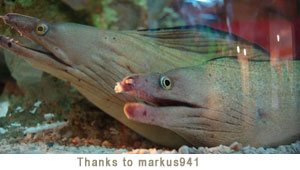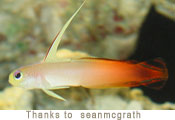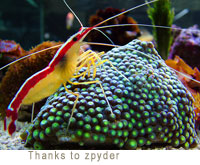Maintaining your Saltwater Aquarium

The health and longevity of saltwater fish are dependant on consistent water conditions. the oceans are crystal clear and the vast expanse of the oceans delivers highest quality water and allows life to flourish. Bringing the piece of ocean into your home requires allot of maintenance and time.
Below are some tips on how to maintain your marine aquarium and keep your saltwater fish happy and healthy!
Re-creating Sea Water
It is unrealistic for most of us to actually collect seawater for our marine aquariums. Thankfully, there are many brands of commercially available salt mixes that you add to your aquarium to re-create the idea conditions of your tank. Follow the directions on the bag closely when adding salt to your tank and for topping up after water changes.Tap water is full of chlorine and other unwanted additives when it comes to your saltwater fish. You can use dechlorinator but if at all possible, use reverse osmosis water for filling up your tank and when doing water changes. Reverse osmosis water is completely void of all nutrients and minerals making a great base to use. The salt mix you purchase has the ideal concentration of minerals for your corals and fish when combined with reverse osmosis water (also known as RO water), and any other specially formulated vitamins and additives, you will be able to perfectly replicate sea water.
Maintaining Water Quality
Adding trace elements and living bacteria to your water in the form of liquid supplements will benefit the natural cycle in your aquarium. Some saltwater fish require supplements as they eat certain bacteria. Some bacteria will aid in the biological filtration of your aquarium and make your maintenance job easier! Trace elements and additives are usually added when you change the water in your aquarium.
The pH of a saltwater aquarium should be 8.3.
Over time, the pH of your aquarium will fall and this can kill your fish. Biological processes in the aquarium will start to lower the pH over time. This is why water changes are so important as it will reset the pH to normal as you remove the waste from the bottom of the tank. Make sure to do a 20 percent water change every one to two weeks and test your pH every week. The pH can fluctuate minute amounts so a pH buffer may useful thing to use, it will help to keep it consistent and add elements that coral need that they derive from higher pH levels, which will harm fish. If you find it difficult to maintain a pH above 8.1 than you should re-evaluate your aquarium maintenance habits and possibly filtration. In some cases an overstocked aquarium (to many inhabitants) can over whelm the filtration system and even regular water changes will not help the Ph. In this case you will need to decrease the number of aquarium creatures living in your tank.
The specific gravity of a marine aquarium should be between 1.018 and 1.024
The specific gravity is the measure of salinity in the water. The oceans are consistent but can be higher on some areas, so a small range is acceptable as long as it stays consistent. Purchase a hydrometer and follow the instructions for use to determine the salinity of your marine aquarium. The only time that the salinity will change is gradually over time it will increase as the water evaporates, the salt does not. To keep your specific gravity consistent, add small amounts of fresh water, preferably reverse osmosis water to top off your aquarium as the water evaporates. Do not wait until the water level drops allot before topping up or you might shock your fish. Add fresh water every week as it evaporates.Water Changes in the Saltwater Fish Tank
When doing water changes, follow the instructions on the page with the link below with the exception that you will need to add the appropriate amount of salt and text the salinity of your tank and compare it with the reverse water you are adding to your tank to ensure the salinity levels are the same. Also be sure to note any manufacturer's recommendations on your filtration equipment to see of you need to turn off the power of disconnect anything before draining the water out of your aquarium. It is recommended to do a 20 percent water change every 2 weeks to ensure optimum water quality and health of your marine fish. Follow these instructions on how to change the water in your tank: How to do water changes
Water Testing
 Test the aquarium water regularly to keep your saltwater fish healthy. Purchase a pH test kit and test your water once a week. Purchase a hydrometer and test the specific gravity every week. test for ammonia and nitrate, these results will let you know how well your filter is functioning. There are various types of testing equipment from tabs you dip in the water to kits where you mix liquids with your saltwater.
Test the aquarium water regularly to keep your saltwater fish healthy. Purchase a pH test kit and test your water once a week. Purchase a hydrometer and test the specific gravity every week. test for ammonia and nitrate, these results will let you know how well your filter is functioning. There are various types of testing equipment from tabs you dip in the water to kits where you mix liquids with your saltwater. Always follow the manufacturers instructions very accurately to prevent false test results. If you test for nitrate and find it high change 20 percent of the water or add denitrifying bacteria to your water. Sometimes you might come across the solution of adding hair algae to solve nitrate problems as they devour this compound, but we strongly advise against it because it becomes an uncontrollable pest!